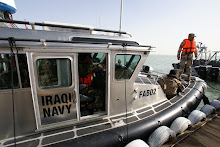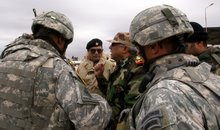By DAVID ESPO
AP Special Correspondent
WASHINGTON (AP) - Move over Republicans. Democrats, too, are divided over Iraq, the issue that increasingly overshadows all others in Congress and the campaign for the White House.
In both parties, it's as if public sentiment is moving so quickly that the politicians can't find the safe ground they covet.
"It was considered absolute heresy four months ago" to cut off war funds, Democratic Sen. Russell Feingold of Wisconsin said earlier this week - a few minutes after 28 Democrats voted to do so effective March 31, 2008.
That mirrored last week's vote in the House, where 169 Democrats lined up behind a plan to withdraw all U.S. combat troops within nine months.
The legislation failed in both cases as Republicans voted nearly unanimously against the bills despite concern about being saddled any longer with responsibility for an unpopular war.
And for now, Democratic leaders must mute their opposition to the war long enough to seek a compromise with Republicans and the Bush administration on a bill to fund military operations through Sept. 30. Those talks began in earnest Thursday when Senate Majority Leader Harry Reid met in his Capitol office with White House Chief of Staff Josh Bolten and Senate Republican Leader Mitch McConnell of Kentucky.
"We'll work through something we can all live with," predicted President Bush, whose veto of an earlier bill was easily sustained by House Republicans.
Unwilling to be tagged with denying resources for troops in the war zone, Democrats hope to pass the funding bill before Congress begins a Memorial Day vacation next week.
Then they will promptly begin challenging Bush and his GOP allies in Congress again.
"We need to change the United States mission and begin the redeployment of our forces," Reid emphasized earlier in the week.
The recent votes in the House and Senate demonstrated for the first time that a sizeable majority of Democrats in Congress favors a quick end to a war in its fifth year.
The same votes also exposed divisions that had been largely hidden from public view as Reid and Speaker Nancy Pelosi labored all winter and spring to show a united front in a brutal veto fight with Bush.
In the Senate, 19 Democrats voted against the cutoff in funds.
They included Sen. Carl Levin of Michigan, chairman of the Armed Services Committee and a longtime critic of Bush's war policy.
In the House, 59 Democrats voted against the troop withdrawal deadline, Majority Leader Steny Hoyer of Maryland among them. More broadly, the list ran heavily to lawmakers in conservative-leaning swing districts, Reps. Joe Donnelly, Brad Ellsworth and Baron Hill of Indiana, for example, all of whom defeated incumbent Republicans last fall.
The split aroused Moveon.Org, the anti-war group that rose to prominence in last fall's elections and then lined up to support a gradual approach to challenging Bush that Pelosi and Reid embarked on.
Four months later, fearing that Democrats ultimately would surrender and give Bush the money he wanted, the organization sent Reid and Pelosi a message saying that if they "appear to capitulate to Bush on Iraq, MoveOn will move to a position of
opposition."
It modestly ratcheted up the pressure on Thursday, announcing low-cost radio ads criticizing Hoyer and Levin. In each case, the commercial said the targeted Democrat was "one of just a few Democrats to vote against ... a real plan for withdrawing from Iraq."
In the presidential campaign as well as in Congress, Democrats are united against the war, but split over how decisively to challenge Bush. In a measure of the issue's importance, White House hopefuls Barack Obama of Illinois and Hillary Clinton of New York abruptly switched positions to support Feingold's legislation cutting off funds.
Both had prominently shunned earlier proposals to set a fixed timetable for an end to the war, drawing challenges from campaign rivals John Edwards and Sen. Chris Dodd of Connecticut. Clinton, in particular, endured booing from anti-war activists for her steadfast rejection of setting a fixed date to end the U.S. role in the fighting.
The shift that Clinton and Obama executed earned something of a political dividend, in one state at least.
In the same ad that criticized Levin for opposing the legislation to end the war, MoveOn pointed out that the two had voted for it.
Whatever their divisions at the moment, Democrats owe much of their victory in last fall's elections and their hope for the White House in 2008 to their opposition to the war.
Republicans stuck with Bush through last fall, grew restless when they lost control of Congress, and now threaten revolt. In the House, 11 moderate GOP House members bluntly told the president and top aides recently that the war poses a significant challenge to the party's political future.
"We let them know that the status quo is not acceptable," said Rep. Tom Davis of Virginia.
Few, if any, Republicans venture a defense of the administration's handling of the war, even those who warn against abandoning Iraq to terrorists.
"Terribly mismanaged" until recently, Sen. John McCain of Arizona summed up recently in the first debate of the presidential campaign.
Other Republicans in Congress say they are awaiting a September report from the top U.S. commander in Iraq, Gen. David Petraeus - not from Bush - before deciding what to do next.
Increasingly, there is talk of the Iraqi government as a critical obstacle to a change in course.
"If they vote to ask us to leave, we'll be glad to comply with their request," McConnell said recently.
Thursday, May 17, 2007
Subscribe to:
Post Comments (Atom)






















No comments:
Post a Comment